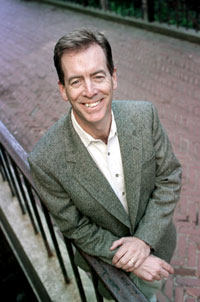|
HOME | SEARCH | ARCHIVE |
|
Former state senator sets up house on campus
Patrick Johnston inaugurates legislator-in-residence program
![]()
By D. Lyn Hunter, Public Affairs
| |  Patrick Johnston, the campus/s legislator-in-residence Noah Berger photo |
21 February 2001
|
The recent presidential election brought back vivid memories for former state legislator Patrick Johnston. In his first bid for the assembly, he was declared the loser — by a mere 18 votes. “Because it was so close, there was an automatic hand recount of all votes,” recalls Johnston, who was 34 at the time of his first campaign, in 1980. “Our expectations were pretty low; but after the recount, we came out ahead by 25 votes.” Johnston’s victory was the start of a 20-year career as an assemblyman and senator. He is on campus this semester to share the fruits of that experience as Berkeley’s first legislator-in-residence, an Institute of Governmental Studies program that taps the expertise of politicians who recently left office because of term limits. (While here, he is also working with the Richard and Rhoda Goldman School of Public Policy.) Politics as rugby Johnston likens the struggle to a rugby game — hence the title of the course he is teaching this semester: “Sorting Out the Scrum of California Policy Making.” A scrum is a rugby play where opposing teams, lined up facing each other, fight to kick a ball thrown on the ground between them, back to a teammate. In the class, Johnston hopes to ground students in the knowledge and skills involved in high-level policy making, and to explore the ways politics and policy intersect. The course also covers the implications of lawmaking in the new term-limit environment. Campus-capital connections “The Legislator-in-Residence program builds upon our work to expand the campus’s relationship with the state capitol,” said Gerry Lubenow, director of the UC Berkeley/Sacramento program. “Working with Patrick, our students can take what they’ve learned in the classroom and see how these theories work in actual policy-making situations.” Among the most significant potential benefits of these exchanges is heightened understanding of the contributions the university makes to California. “More money is likely to be approved for Berkeley if policy makers have actual, one-on-one experiences with this wonderful academic resource,” he says. Bridging the divide between politics and academia “The legislators need to listen to and learn from faculty and not be tempted to sound off,” said Johnston. “If this isn’t kept in check, the professors end up becoming another audience for a political speech.” By the same token, Johnston says, faculty members sometimes go on too long about their research when talking to legislators. In academia, they are used to substantiating their findings, but in the halls of government, they need to make their points succinctly, he said.
Winning an election is only one battle in the political war, Johnston notes. Once in office, legislators must skirmish with other lawmakers, lobbyists and the administration to develop sound ways to run the state.
Through teaching, writing, moderating conferences and consulting with students and faculty from various disciplines, Johnston hopes to strengthen connections between Berkeley and the state government. That includes bringing politicians to campus to observe first-hand Berkeley’s teaching and research, as well as taking faculty and students to Sacramento to advise legislators on specific issues.
Johnston says bridging the divide of politics and academia can be challenging. At campus conferences or legislative hearings, when politicians and scholars are put in the same room, a communication gap can occur.
Johnston, who also teaches a course at CSU-Sacramento, is on campus every Thursday through June. He encourages students and faculty to contact him at 642-1474 to discuss links between their research and the state political process.
Home | Search | Archive | About | Contact | More News
Copyright 2000, The Regents of the University of California.
Produced and maintained by the Office of Public Affairs at UC Berkeley.
Comments? E-mail berkeleyan@pa.urel.berkeley.edu.